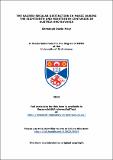Files in this item
The sacred–secular distinction in music during the eighteenth and nineteenth centuries in Austria and Bavaria
Item metadata
| dc.contributor.advisor | Brown, David | |
| dc.contributor.advisor | Allen, Roger | |
| dc.contributor.author | Mayr, Christoph David | |
| dc.coverage.spatial | 186 | en_US |
| dc.date.accessioned | 2015-07-07T14:39:35Z | |
| dc.date.available | 2015-07-07T14:39:35Z | |
| dc.date.issued | 2015-06-23 | |
| dc.identifier.uri | https://hdl.handle.net/10023/6924 | |
| dc.description.abstract | This thesis explores the sacred–secular distinction in the musical life of Austria and Bavaria during the eighteenth and nineteenth century with particular focus on its legitimacy and feasibility. It examines the attempts made by Joseph II of Austria to separate sacred and secular sphere by banning secular music from the church and finds them to have failed. Joseph’s endeavours are compared to those of the Cecilian Movement, which, although similar in their aim, are found to be motivated very differently, yet equally unsuccessful. A study of the rise of the public concert and choral societies points towards new loci for secular music as well as the spiritual experience of music. Finally Anton Bruckner is discussed as an example for filling old and new loci with a successful synthesis of sacred and secular, both in his lived life and his musical composition. Bringing sacred and secular together conforms to the natural state of Christian life in the world and bears the potential for mutual benefit which outweighs the presumed advantages of distinct lines of separation. | en_US |
| dc.language.iso | en | en_US |
| dc.publisher | University of St Andrews | |
| dc.subject | Sacred-secular distinction | en_US |
| dc.subject | Music | en_US |
| dc.subject | Nineteenth century | en_US |
| dc.subject | Bruckner | en_US |
| dc.subject | Church music | en_US |
| dc.subject | Secular music | en_US |
| dc.subject | Sacred music | en_US |
| dc.subject | Cecilianism | en_US |
| dc.subject | Concert | en_US |
| dc.subject | Joseph II | en_US |
| dc.subject | Josephinism | en_US |
| dc.subject | Cecilian movement | en_US |
| dc.subject | Austria | en_US |
| dc.subject | Bavaria | en_US |
| dc.subject.lcc | ML246.3M2 | |
| dc.subject.lcsh | Music--Austria--18th century--History and criticism | en_US |
| dc.subject.lcsh | Music--Austria--19th century--History and criticism | en_US |
| dc.subject.lcsh | Music--Germany--Bavaria--18th century--History and criticism | en_US |
| dc.subject.lcsh | Music--Germany--Bavaria--18th century--History and criticism | en_US |
| dc.subject.lcsh | Music--Religious aspects | en_US |
| dc.title | The sacred–secular distinction in music during the eighteenth and nineteenth centuries in Austria and Bavaria | en_US |
| dc.type | Thesis | en_US |
| dc.type.qualificationlevel | Doctoral | en_US |
| dc.type.qualificationname | MPhil Master of Philosophy | en_US |
| dc.publisher.institution | The University of St Andrews | en_US |
| dc.publisher.department | Institute for Theology, Imagination and the Arts | en_US |
This item appears in the following Collection(s)
Items in the St Andrews Research Repository are protected by copyright, with all rights reserved, unless otherwise indicated.

